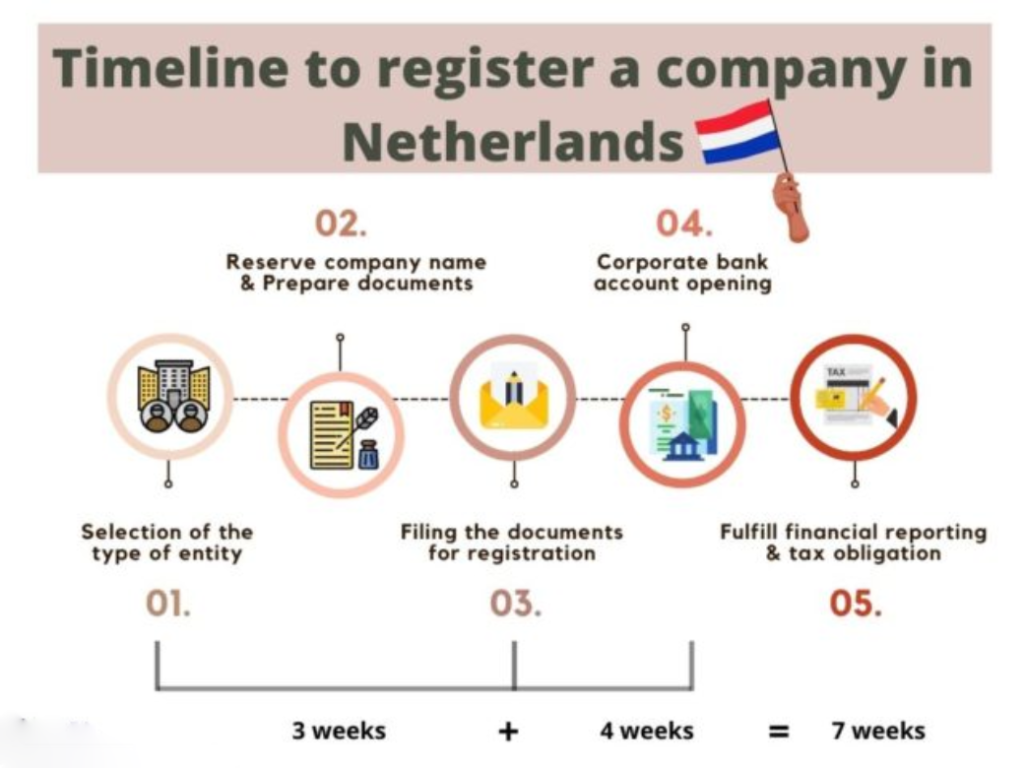
Introduction
Looking to establish your company in the Netherlands? Understanding the Dutch branch registration timeline is essential for a smooth and successful setup. From gathering the necessary documents to completing the registration process, each step plays a crucial role in expanding your business internationally. In this article, we will guide you through the entire timeline, providing valuable insights and tips along the way.
Why Register A Branch In The Netherlands?
Expanding your business to the Netherlands offers numerous benefits, including access to a highly skilled workforce, a strategic location within Europe, and a favorable business environment. By registering a branch in the Netherlands, you can establish a physical presence and tap into the Dutch market, while maintaining your existing corporate structure. This allows you to take advantage of the country’s well-developed infrastructure, favorable tax regime, and strong business network.
Legal Requirements For Registering A Branch In The Netherlands
Before diving into the registration process, it is important to understand the legal requirements for establishing a branch in the Netherlands. One of the key aspects is selecting a suitable business name for your Dutch branch. The name should comply with the Dutch naming conventions and should not be misleading or infringe upon existing trademarks. Additionally, you will need to provide proof of the legal existence of your company, such as a certificate of incorporation.
Choosing A Business Name For Your Dutch Branch
Selecting an appropriate business name for your Dutch branch is crucial for creating a strong brand identity and attracting customers. When choosing a name, consider the local market and cultural nuances. It is advisable to consult with a legal expert or a branding specialist who can guide you through the process and ensure compliance with Dutch regulations. Remember that a well-chosen business name can make a lasting impression on your target audience and contribute to the success of your branch.
Gathering Required Documentation For Branch Registration
To initiate the branch registration process, you will need to gather the necessary documentation. This typically includes a copy of the articles of association, a certificate of incorporation, a notarized power of attorney for the managing director, and proof of the legal address in the Netherlands. It is essential to have all these documents in order to avoid delays in the registration process. Additionally, you may be required to provide additional documents depending on the nature of your business.
Submitting The Application For Branch Registration
Once you have gathered all the required documentation, the next step is to submit the application for branch registration. This is done through the Dutch Chamber of Commerce (Kamer van Koophandel). The application form requires detailed information about your company, such as the business activities, the names of the directors, and the address of the branch. It is important to ensure that all the information provided is accurate and up to date to avoid any complications during the registration process.
Timeline For Branch Registration Process
The timeline for branch registration in the Netherlands can vary depending on various factors, such as the complexity of your business structure and the availability of the required documentation. On average, the registration process can take anywhere from a few weeks to a few months. It is advisable to start the process well in advance to allow for any unforeseen delays. Working with an experienced legal professional can help streamline the process and ensure a smooth and timely registration.
Possible Challenges And Solutions During The Registration Process
While the branch registration process in the Netherlands is generally straightforward, there can be challenges along the way. These challenges may include language barriers, unfamiliarity with local regulations, or difficulties in obtaining certain documents. To overcome these challenges, it is important to seek guidance from professionals who have experience in Dutch company law and can provide valuable insights and solutions. By addressing these challenges effectively, you can ensure a seamless registration process.
Post-Registration Obligations For A Dutch Branch
Once your branch is registered in the Netherlands, there are certain post-registration obligations that you need to fulfill. These obligations include maintaining proper accounting records, submitting annual financial statements, and complying with Dutch tax regulations. It is important to stay updated on any changes in the legal and regulatory landscape to ensure compliance with all obligations. Failure to fulfill these obligations can result in penalties and legal consequences.
Conclusion And Next Steps
Establishing a branch in the Netherlands can open up new opportunities for your business and facilitate international expansion. By following the correct procedures and meeting the necessary requirements, you can confidently navigate the Dutch branch registration timeline. From selecting a business name to submitting the application and fulfilling post-registration obligations, each step plays a crucial role in the success of your branch. For a smooth and efficient registration process, it is advisable to seek professional assistance and stay informed about the latest developments in Dutch company law.
Now that you have a comprehensive understanding of the Dutch branch registration timeline, you can take the necessary steps to establish your presence in the Netherlands and unlock new opportunities for your business. With careful planning and expert guidance, you can embark on a successful journey of international expansion and growth.

